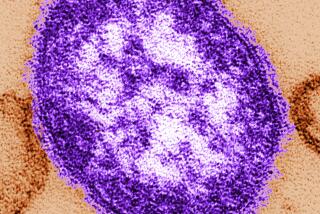Editorial: Blame Disneyland measles outbreak on anti-science stubbornness
- Share via
The most recent outbreak of measles, set off by an unvaccinated visitor to Disneyland, may be contained before it spreads too far. With luck, there will be no deaths or serious, long-lasting complications. But it has already sickened more than 30 people in four states — all traceable back to this single Patient Zero. That should worry and enrage the public because it is a reminder of the far worse scenario that could occur if the anti-vaccine movement doesn’t get over its ignorant and self-absorbed rejection of science.
This is exactly what epidemiologists worry about: One unvaccinated person with a disease that is highly contagious traveling to a tourist destination that draws people from throughout the world — even before she knows she’s ill. In this case, the woman was packed in with others at the theme park, including babies too young to have been vaccinated. She traveled in the tight confines of two airliners, and she visited other attractions as well.
What has kept this from becoming a nightmare scenario so far is the fact that most Americans still do the right thing; they continue to be vaccinated. That “herd immunity” of the vast majority protects the vulnerable — those too young to have been inoculated, or people with medical conditions that make vaccination-risky, as well as the few who receive the vaccine but don’t derive immunity from it.
But that protection is being eroded as the anti-vaccination movement grows, laying the groundwork for ongoing and bigger outbreaks — even though the risks associated with the vaccine are rarer than the risks associated with the illness. Getting vaccinated is good for the health of the inoculated person and also part of one’s public responsibility to help protect the health of others.
The prospect of a new measles epidemic is disturbing. So is the knowledge that many ill-informed people accept a thoroughly discredited and retracted study in the journal Lancet that purported to associate vaccination with autism, and that others mumble darkly about mercury in the inoculations. The kind of mercury that used to be in vaccines was ethylmercury, which is eliminated from the body quickly, not the truly dangerous methylmercury. In any case, the measles vaccine no longer contains it.
It’s bad enough that a nasty strain of flu has now hit 46 states; our ability to fight that is limited because doctors must make an educated guess, many months in advance, about which flu strains will be dominant. This year, the guess didn’t work out, and flu shots have been less effective.
But measles is a disease that has been beaten by modern medicine. That makes it all the more frustrating that anti-science stubbornness has proven, in the case of the Disneyland-related measles, that when it comes to contagious diseases, it’s a small world after all.
Follow the Opinion section on Twitter @latimesopinion
More to Read
A cure for the common opinion
Get thought-provoking perspectives with our weekly newsletter.
You may occasionally receive promotional content from the Los Angeles Times.










